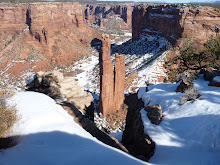I had a very lazy day of tv and cross-stitch yesterday, so thought I'd take today to talk a little more about Navajo culture and history.
But first, the ongoing saga of the electricity. I plugged my cell phone charger into an outlet in the kitchen early this morning, and believe it or not, it tripped the breaker. Didn't know at first what had happened, as the only evidence I saw was that the clock on the stove had gone dark. But then the stove wouldn't light, as it is an electronic-ignition gas stove. Fortunately, my neighbor had returned home for a minute and I was able to borrow some matches. Still thinking it was just the stove, I opened the refrigerator to get eggs and discovered I had a worse problem--that was out, too.
So I had to call Budd to come and rescue me, AGAIN. Didn't want to wait until lunchtime because if it had been more than just the breaker, we stood to lose all the food. Budd came home and went out to the breaker box, which is on the neighbor's side of the building, and couldn't find any breakers tripped, so he came in and shut down all the electronics so he could turn off everything. Except when he came back, nothing had turned off. The boxes were mislabelled, or the A and B sides have switched since they were labelled. We had turned off all of Tess' stuff instead of ours. When we finally got everything straight, just had to reset the ground on one of the outlets and everything was back to normal. Now I'm afraid we'll have an electrical fire at some point because of all the electronics we have plugged in. Maybe that's why there are two huge fire extinguishers here. That haven't been tested since 2008 according to the 'monthly' test log. Seriously, who lives like this?
OK, ready for Navajo genealogy? As I mentioned yesterday, it's a matriarchal society, meaning that the children trace their clan lineage through their mother. The mother's sisters are also considered mothers to her children, and their children are brothers and sisters to them. Grandmothers and great-aunts are all considered grandmothers, and so on. The mother's father is a 'true' grandfather, as are all of the grandmother's brothers. The children are born 'into' the mother's clan.
However, because family is so important, the father's relatives aren't left out. His children are born 'for' the father's clan. The father's brothers and sisters are uncles and aunts, and their children are cousins. This was the source of Ruby-the-rug-weaver's confusion when I at first told her I had met her cousin. The woman I met (Ruby's mother's sister's daughter) is considered a sister, not a cousin. When the sister said "That's how close we are," she was emphasising that this was an extended family relationship, not a less-important clan relationship that would still use the same words.
Clan members may never have met each other and bear no strong blood relationship, but they are all considered relatives. When anyone in the clan, the extended family or the immediate family needs help, everyone should chip in. My informant, Paul, said that this doesn't happen as much any more. He also said that it's getting more rare for a man to leave his family home and join that of his wife. He himself lives on his mother's land, for example. He didn't, though, until his mother and father divorced and his mother returned home to her mother's people with the children. It was also when he learned to speak Navajo, because his grandmother didn't speak much English.
I learned a little more as I was reading a book called 'Stories of the Long Walk', which is a Dineh University Press publication of stories that were collected, translated, and published by Navajo researchers. At the time of its publication (1973) it was the first scholarly work to be published about Navajos by Navajos. It was here I learned that The People (Dineh, sometimes spelled Dine, with an accent over the e) trace all of their clan relationships back at least two generations. This is far too complicated to relate here, but it does go to show how important family and family connections are to these people.
Subscribe to:
Post Comments (Atom)

No comments:
Post a Comment